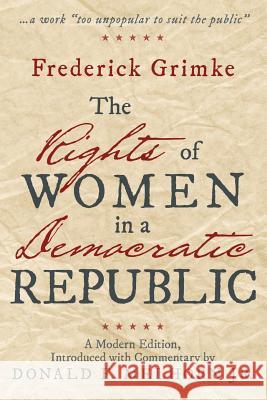The Rights of Women in a Democratic Republic: A Modern Edition, Introduced with Commentary by Donald F. Melhorn Jr. » książka
The Rights of Women in a Democratic Republic: A Modern Edition, Introduced with Commentary by Donald F. Melhorn Jr.
ISBN-13: 9781480829282 / Angielski / Miękka / 2016 / 200 str.
The Rights of Women in a Democratic Republic: A Modern Edition, Introduced with Commentary by Donald F. Melhorn Jr.
ISBN-13: 9781480829282 / Angielski / Miękka / 2016 / 200 str.
(netto: 64,57 VAT: 5%)
Najniższa cena z 30 dni: 67,62
ok. 16-18 dni roboczych
Dostawa w 2026 r.
Darmowa dostawa!
Frederick Grimke is the last person anyone - including scholars who have recounted the careers of his two sisters Sarah and Angelina in the nineteenth century feminist movement - would have suspected of having a sympathetic interest in women's rights. An intellectual with quietly held opinions on secession and slavery reflecting his antebellum southern heritage, who spent the last two decades of his life pursuing interests in political theory, he was famous among fellow townsmen for his aversion to female company. But his affection for his sisters and his admiration for what they had achieved in their public careers inspired this essay, "The Rights of Women in a Democratic Republic," in which he made a remarkably prescient forecast of the vocational future of American women - including married women with children - once given access to higher education. The essay was nearly lost. Grimke himself had doubts about it, and after appealing to Sarah to help him resolve them, died in 1863 leaving an instruction that it be omitted from the edition of all his writings which his executor published in 1871, in a cheaply fabricated volume with very small distribution. Melhorn's Epilogue reveals who the executor was, and how he came to disobey the order for the essay's suppression. With new research findings revealing Grimke's influence on his sister Sarah's writings, and the discovery of feminist issues as an undergraduate debate topic at Yale where he was educated, Melhorn's Commentary broadens the scope of the history of women's rights in America.
pFrederick Grimke is the last person anyone – including scholars who have recounted the careers of his two sisters Sarah and Angelina in the nineteenth century feminist movement – would have suspected of having a sympathetic interest in women’s rights. An intellectual with quietly held opinions on secession and slavery reflecting his antebellum southern heritage, who spent the last two decades of his life pursuing interests in political theory, he was famous among fellow townsmen for his aversion to female company. But his affection for his sisters and his admiration for what they had achieved in their public careers inspired this essay, “The Rights of Women in a Democratic Republic,” in which he made a remarkably prescient forecast of the vocational future of American women – including married women with children – once given access to higher education. /ppThe essay was nearly lost. Grimke himself had doubts about it, and after appealing to Sarah to help him resolve them, died in 1863 leaving an instruction that it be omitted from the edition of all his writings which his executor published in 1871, in a cheaply fabricated volume with very small distribution. Melhorn’s Epilogue reveals who the executor was, and how he came to disobey the order for the essay’s suppression. /ppWith new research findings revealing Grimke’s influence on his sister Sarah’s writings, and the discovery of feminist issues as an undergraduate debate topic at Yale where he was educated, Melhorn’s Commentary broadens the scope of the history of women’s rights in America./p











